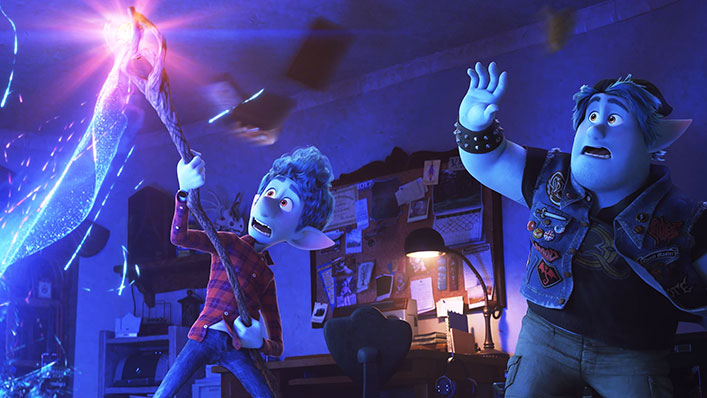Has Pixar dropped the ball with Onward?
This film is slathered with shiny surfaces but never really comes alive.

Pixar studios are known for high quality films. But their latest feature – about two elves on a mission to find a magical rock – is a disappointment, writes critic Luke Buckmaster.
A very Michael Leunig-esque idea lies at the heart of Pixar’s new film Onward: the notion the world used to be full of magic, but then a rotten thing called technology came along and ruined everything. Surrendering to another nasty word called “progress,” a utopian world of fantasy and adventure – radiant with the greenest of grass and the bluest of sky – transmogrified into a sludge pit of selfies, flashing screens and high-pitched electronic noises.
The fact this CGI-animated feature (which arrives in Australian cinemas in April) uses magical technology to tell a story denouncing the relationship between technology and magic is, of course, entirely lost on the director and co-writer Dan Scanlon, who slathers it with shiny surfaces but never makes the experience truly come alive. So is the fact that the crux of the plot relies on an ancient spell – from this supposedly better, idealistic time of old – that doesn’t work: a faulty piece of magical apparatus running on a kind of primitive rock-battery.
The film’s two central characters – brothers Ian (voice of Tom Holland) and Barley (Chris Patt), who are elves – open a package left to them by their deceased father, an accountant who dabbled in wizardry. He figured out a way to be beamed back into existence, albeit only for a single day, so that he could walk the earth once more, many moons since his death, and see the grown-ups his boys – or boy-elves, or belves, or whatever you call young elves – became.
But you know what they say about accountants: they know the price of everything and the value of nothing. So dad returns, indeed to walk the earth once more, but the spell that brings him back buggers up, so only the bottom half of his body – from the belt down – appears. There’s a dirty joke in there somewhere. Alas, this is a family affair: a road movie following the brothers as they decipher clues from an old map in pursuit of a ‘Phoenix gem’ capable of completing the spell before dad exits the mortal coil for the second and presumably final time.
Like Bright, the Netflix buddy cop movie starring Will Smith alongside Joel Edgerton as a blue splotchy-skinned orc, Onward is based in a world where fantastic things such as pixies and dragons exist (the dragons in this instance filling in for dogs, the pixies for bikies, and everything else for other things we already have, robbing them of the very magical qualities the film pretends to mourn). Also, like Bright, Onward is not very good, half-hearted as a fantasy and incompetent as a social commentary.
There is never any sense of stakes, despite the ticking clock premise. The objective-based plot – involving whisking from one location to another and resolving clues and/or basic dilemmas, with half-dad tagging along – frequently resets itself to the same basic coordinates, so there is little sense of progression. The chemistry between Ian and Barley is flat, partly because they’re both the dweeby misfit character, with little to distinguish them beyond the latter’s Jack Blackian boisterousness and an obsession with a role-playing game that is sort of, but not completely, tied to the history of this universe.
The most interesting questions in Onward are raised accidentally. For instance: did technology kill the magic of old, or did capitalism? When the brothers hotfoot it to their first destination, which legend has it is a mysterious tavern run by a warrior-like Manticore, they are shocked to discover it’s been turned into a tacky family restaurant serving cheap fried food, and the Manticore (Octavia Spencer) is now a stressed-out manager.
But was it really technology that put awful food on the menu and a gaudy karaoke machine in the corner? Was it really technology that required the place to have a gift shop and some poor, underpaid employee to dress up in a mascot costume? Was it technology that made staff give out free boxes crayons to kids on the way out?
Technology didn’t do that, friends. Capitalism did that. Scanlon of course remains totally oblivious to this: another part of his own film he doesn’t seem to understand, or be remotely interested in. How did the director manage to make a film about so few things, and have so many of them fly over his hand? Maybe, like Ian and Barley’s old man, he arrived on set half-rendered; maybe the top half is Michael Leunig.






















